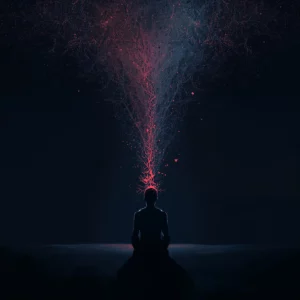Table of Contents
“Just tell me why.”
It’s the sentence that echoes in the minds of so many after a breakup. Maybe you said it out loud in a final text. Maybe you whispered it into the dark, replaying the last words they spoke, hoping for some hidden clue. Or maybe you never got the chance to ask at all—because they ghosted you, or ended things with a vague “it’s not you, it’s me.”
This longing for answers feels primal, almost physical. We call it closure. We imagine it as a key—one we must retrieve from the person who left us before the door to healing will finally unlock. But what if that key doesn’t exist? What if, as some experts argue, closure after a breakup is less of a gift others give us and more of a process we create ourselves?
Why closure after a breakup feels so necessary
Breakups don’t just hurt emotionally—they create a kind of psychological vacuum. Our minds are wired to seek patterns and resolution. When a relationship ends without explanation, it’s like a novel missing its final chapter.
Psychologists call this the need for cognitive closure. For some people, it’s stronger than for others. Studies (like Leckfor et al., 2023) show that when this need is high and unmet—such as in cases of ghosting—people experience heightened distress, lower self-esteem, and a reduced sense of control.
Your brain hates ambiguity. It perceives it as a threat. That’s why we scroll through old texts, stalk social media for signs, and replay conversations—trying desperately to fill the gaps in the story. We’re not “weak” for doing this; we’re human.

Why closure from your ex rarely works
Here’s the hard truth: even when you get the chance to ask “why,” the answer rarely feels satisfying.
Maybe they tell you, “I just wasn’t ready for commitment” or “I fell out of love.” Instead of relief, you feel new waves of anger, sadness, or confusion.
That’s because the kind of closure we hope for—a clean, conclusive ending—may not exist. Research into ambiguous loss (Robinson & McInerney, 2024) shows that when endings lack clarity, our minds can’t easily process them as “done.”
Closure that depends on someone else’s words is fragile. It rests on their ability (or willingness) to be honest, kind, and self-aware—traits that aren’t always present in someone who just ended a relationship.

Why Breakups Hurt So Much (Science of Heartbreak & Healing)
Let’s examine breakups in: Biology of love & loss, Attachment styles, Rejection psychology, Closure, Rumination, Grief
Tap here to read more →What real closure looks like
So if closure isn’t something we can extract from another person, what then?
Experts say healing comes from within. Instead of demanding answers that may never come, we can shift focus to what’s within our control: our own narrative.
- Making space for unanswered questions and choosing to live fully anyway.
- Reframing the breakup as an experience that, painful as it was, taught you about your needs and boundaries.
- Focusing on the present, building new routines and relationships that support your growth.
This process is not linear, and it doesn’t happen overnight. But over time, the hold of those unanswered “whys” begins to soften.

A quiet ending
Perhaps the biggest myth about closure is that it comes with fanfare—a final conversation, a cathartic cry, a sense of absolute completion.
But more often, it arrives quietly.
One day, you notice their name doesn’t sting like it used to. The story of the breakup is no longer a wound but a scar—proof of healing, not of harm. And you realize:
Closure wasn’t something they could have given you after all.
It was something you created.
FAQ
Q1. Can you ever truly get closure after a breakup?
Closure is less about a single moment of clarity and more about an internal process of accepting unanswered questions and focusing on personal healing.
Q2. Why does it feel impossible to move on without closure?
Our brains crave complete stories, and ambiguous breakups create emotional uncertainty that triggers rumination and distress.
Q3. Is asking your ex for closure a good idea?
It rarely brings lasting relief and can prolong emotional pain if their explanation is unsatisfying or absent.
Q4. How do I create my own closure after a breakup?
Shift your focus inward: reframe your story, lean on support, and cultivate present-focused routines to regain agency.
Scientific Sources
-
Leckfor et al. (2023): Study shows need for closure can magnify emotional effect of ghosting
Key Finding: People with a high need for closure experience lower psychological well-being and amplified distress after ambiguous breakups like ghosting.
Why Relevant: Shows how craving closure can intensify pain when it’s unavailable.
https://phys.org/news/2023-02-closure-magnify-emotional-effect-ghosting.html -
Boss, Kruglanski & Webster (1996–2012): Need for Cognitive Closure: Motivated Closing of the Mind
Key Finding: High need for cognitive closure leads to seizing on premature explanations, which may create illusory closure rather than true resolution.
Why Relevant: Explains why answers from an ex often fail to provide peace.
https://en.wikipedia.org/wiki/Closure_(psychology) -
Robinson & McInerney (2024): The Myth of Closure: Often impossible in ambiguous loss
Key Finding: Closure is not an event but an ongoing psychological process, especially in ambiguous losses like sudden breakups.
Why Relevant: Supports the idea that closure must be internally created.
https://www.psychologytoday.com/ca/blog/passion/202408/the-truth-about-getting-closure
- Rewriting the Story: The Transformative Power of Self-Closure

- The Ultimate Guide to Emotional Detachment Without Closure

- Closure After a Breakup: The Shocking Truth Experts Reveal

- The Surprising Psychology of Unanswered Questions After a Breakup

- The Healing Power of a Closure Letter: How to Let Go and Move On

- When They Ghost You: A Powerful Guide to Healing and Finding Closure

- Emotional Closure: The Surprising Truth About Letting Go and Moving On

- The Hidden Science of Closure After a Breakup: Why You Crave It and How to Heal


Leave a Reply